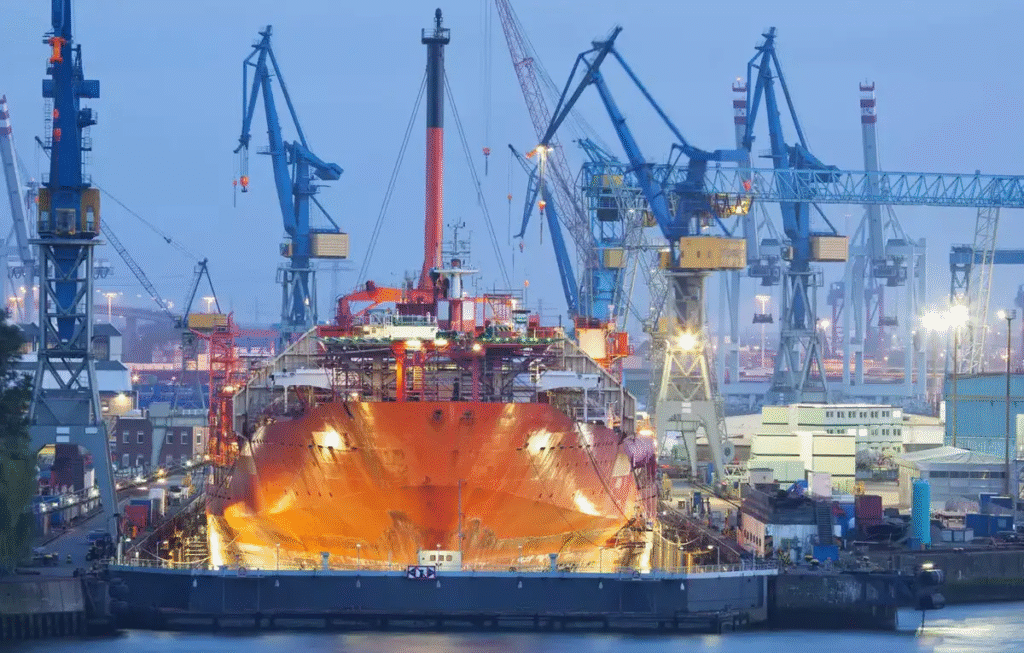
Image Source – ET Infra
Strategic Importance of Shipbuilding for India
India must strategically enhance its shipbuilding and maritime industry to capitalize on emerging global opportunities and strengthen its position in the international maritime arena.
Though India possesses strong potential in shipbuilding, it faces significant challenges that demand strategic investment, infrastructure development, and comprehensive policy support to realize its ambitious goals.
Current Global Position
India currently holds just 0.07% of the global shipbuilding market. In contrast:
- China dominates with 64.7%
- South Korea follows with 28%
- Japan maintains 15%
This glaring disparity reflects the urgent need for India to scale up efforts if it wishes to be a global contender.
India’s Untapped Advantages
India is uniquely positioned to excel in shipbuilding due to:
- Abundant iron and raw materials
- Access to advanced technologies
- A vast coastline and strategic geographic location
- Affordable labor
- Large landmass for industrial infrastructure
Despite these advantages, post-independence India did little to prioritize this sector. However, the current administration under Prime Minister Narendra Modi is pushing to reclaim India’s maritime legacy through bold and targeted reforms.
Infrastructure and Maritime Vision
Key infrastructure initiatives include:
- Development of 6 new deep-water ports
- Establishment of 2 major transshipment hubs
- Launch of multiple deep-water ports along India’s vast coastline
Notably, the Vadhavan Port project on the western coast (150 km from Mumbai) is central to India’s plan to improve maritime trade connectivity with Europe and the Middle East.
In line with global environmental goals, India is also:
- Promoting hydrogen-powered vessels
- Supporting green ships using biofuels
Why Not Just Hire Ships Instead of Building Them?
While hiring ships might seem simpler, building ships domestically has far-reaching economic and strategic benefits:
- Boosts allied industries (steel, electronics, etc.)
- Generates employment
- Improves trade efficiency
- Ensures sovereign control over maritime logistics and security
- Opens business opportunities along key trade routes
India’s Market Growth and Aspirations
India’s shipbuilding market has grown from $90 million in 2022 to $120 million in 2024, and is projected to reach $8 billion by 2033, with a CAGR of 60%.
India’s long-term vision includes:
- Entering the top 5 shipbuilding nations
- Achieving a market valuation of $62 billion by 2047
These projections are bold but feasible, given India’s geo-strategic location and strong government backing.
Major Challenges in Scaling Shipbuilding
Despite the ambition, India must address several critical issues:
- Poor access to shipyards and underdeveloped maritime logistics
- Lack of a robust supply chain
- Uncompetitive pricing and production cycles
- Limited technical expertise and outdated technology
- Previous efforts (peaking in 2010) were derailed by the global financial crisis and domestic inefficiencies
Competing with global giants like China, South Korea, and Japan demands:
- Technology transfer agreements
- A highly skilled workforce
- Massive infrastructure upgrades
Government Initiatives and Strategic Measures
- The government has committed a $3 billion fund and a 250 billion INR Maritime Development Fund to boost shipbuilding, including subsidies for green and hydrogen-powered vessels, aiming to modernize and expand shipyards like Cochin Shipyard and Mazagon Dock.
- Efforts include courting South Korean and Japanese shipbuilders for collaboration and technology sharing, and creating a comprehensive maritime ecosystem involving steel, electronics, and renewable energy industries.
- The Ministry of Ports, Shipping, and Waterways is coordinating with other ministries to develop state-run shipping fleets, ensuring stable demand for domestically built ships and reducing reliance on imports, which currently cause an annual capital outflow of nearly $2 billion.
- Emphasis is placed on sustainable shipbuilding practices to align with global trends toward eco-friendly vessels, potentially positioning India as a leader in green maritime solutions.
Opportunities and Outlook
- India is well-positioned to fill the gap in building lower-value and smaller cargo ships as Chinese yards focus on more complex vessels.
- Growing domestic demand for replacing about 700 commercial ships by 2047 (including 200 ocean-going and 500 coastal/inland vessels) presents a steady market for Indian shipbuilders.
- Expansion in shipbuilding is expected to generate millions of jobs and boost ancillary industries such as steel and engineering, contributing significantly to economic growth and national security.
Conclusion
India can succeed in shipbuilding if it continues to invest heavily in infrastructure, technology, and workforce skills, while fostering international partnerships and streamlining regulatory frameworks. The government’s multi-billion-dollar funding and strategic policies reflect a serious commitment to transforming India into a major shipbuilding power by 2030 and beyond, though achieving these ambitious targets will require overcoming entrenched challenges and global competition.
Key Citations :
- https://splash247.com/can-india-reach-its-ambitious-shipbuilding-targets-2/
- https://infra.economictimes.indiatimes.com/news/ports-shipping/can-india-realise-its-shipbuilding-ambitions/111527639
- https://www.seatrade-maritime.com/shipyards/india-aims-for-shipbuilding-stars
- https://www.lloydslist.com/LL1152499/India%E2%80%99s-latest-attempt-to-become-a-shipbuilding-powerhouse-appears-more-convincing
- https://www.insightfultake.com/details/boosting-indias-economic-growth-through-shipbuilding-a-strategic-roadmap